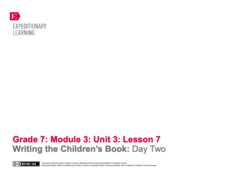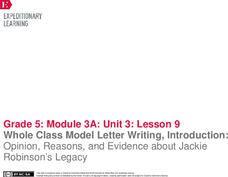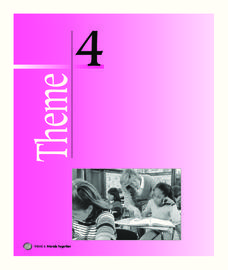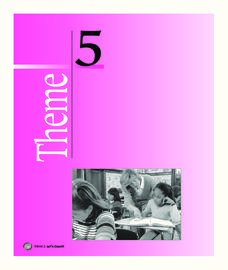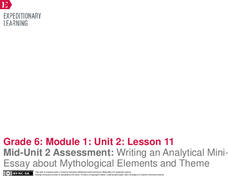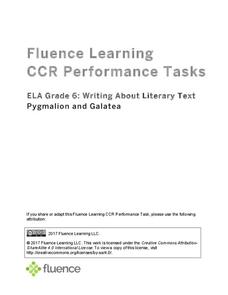K20 LEARN
Brushstrokes: Communication/Using Descriptive Language
Sometimes a picture reflects a thousand descriptive words. To illustrate the importance of sensory words in descriptive writing, scholars listen to a song and craft a painting in response. After sharing their work with the class,...
Curated OER
Write a Short Story
Students compare two paintings, depicting urban life in America in the 1940's, answering a series of questions, then create a short story about the paintings' characters. They compare 'Nighthawks' and 'Nightlife.'
Curated OER
Theater Lesson: Modify My Action
Young scholars engage in a lesson plan that is about the meaning of a verb or adverb. They perform sketches with the subject matter of the words. The goal is for the actors to show the meaning of the verb or adverb with an action.
Channel Islands Film
Cache: Lesson Plan 3 - Grades 4-5
Should the excavation of what is believed to be the cave of the Lone Woman of San Nicholas Island be allowed to continue? As a practice exercise designed to prepare pupils for a timed writing exam, individuals read two Los Angeles Times...
K20 LEARN
Arguing With Evidence: Deconstructing Arguments Part 1
In the first lesson in a two-part series, high schoolers pick a social issue important to them and examine an article about the topic, the arguments and evidence used to support the writer's stance, and craft two counter-arguments to the...
K20 LEARN
Trigger Warnings - Intellectual Rights and Responsibilities: Banned Books, Censorship Part 1
"Warning: Conducting this lesson may be harmful." Such statements, called "Trigger Warnings," are the focus of a two-part lesson that looks at censorship, especially the pros and cons of trigger warnings. Class members read two articles,...
Walden Woods Project
19th Century Lessons for 21st Century Lives
The words of Henry David Thoreau on Civil Disobedience seem particularly relevant today, as are his writings and those of other transcendental thinkers who ask what it mean to live deliberately and what are the responsibilities of...
K20 Learn
Annotating a Text: Style and Syntax
If you have a favorite author, you probably recognize their style. Conduct a close read of the text, marking it up as they go. Collaborative sharing time and a summary writing prompt follow the main activity.
EngageNY
Writing the Children’s Book: Day Two
Following a brief mini-lesson on using dialogue in fiction, young writers continue day two of their writing workshop. They work on the second half of their Children's Book Storyboards, and then they turn and talk with partners to reflect...
EngageNY
Whole Class Model Letter Writing, Introduction: Opinion, Reasons, and Evidence about Jackie Robinson’s Legacy
Sharing is caring! Using the collaborative lesson, scholars engage in a shared writing process with the teacher. Working together, they compose opinion letters about Jackie Robinson's legacy.
Nebraska Department of Education
Personal Roadmap
Sometimes you need a map to get to your destination. High schoolers list 10 short and long terms goals and personal assets they have that will help them achieve these goals. They then craft a paragraph in which they reflect on how these...
Scholastic
Calligraphy Minibook
Engage young learners in practicing their counting skills while teaching them about the Japanese writing system with this printable book. Using the included key that shows the kanji characters for the numbers 1-10, children count the...
Scholastic
Frindle Lesson Plan
"Who says a pen has to be called a pen? Why not call it a frindle?" Inspired by this quote from the award-winning novel written by Andrew Celements, this lesson allows children to invent their own terms for common classroom objects,...
Houghton Mifflin Harcourt
Friends Together: English Language Development Lessons (Theme 4)
Enjoy this thematic friendship unit compiled with ESL lessons to develop strong language development while listening, speaking, looking, and moving. Class members participate in activities covering topics like making friends, asking for...
Houghton Mifflin Harcourt
Let’s Count!: English Language Development Lessons (Theme 5)
Counting is the theme of this compilation of ESL lessons. Through listening, speaking, and moving, your young learners take part in a variety of activities to enhance their English proficiency such as making menus and books,...
Houghton Mifflin Harcourt
Home Sweet Home: English Language Development Lessons (Theme 5)
Through grand discussion, picture cards, and poems, enhance language proficiency with a Home Sweet Home themed unit created to support English language development. Each lesson follows a listen, speak, move, and/or look routine that...
EngageNY
Grade 10 ELA Module 2: Unit 3, Lesson 7
It's time to show what you know. The final lesson asks scholars to reflect on the seven-lesson plan unit and complete an end-of-unit task. Readers consider the claims presented in speeches by Eleanor Roosevelt and Malala Yousafzai before...
K20 LEARN
Making Sense of MLA: Citing Sources and MLA Formatting
The Modern Language Association (MLA) Style Sheet is about giving credit where credit is due. And while there are different style sheets, the one most often used in Language Arts is the MLA. In this lesson, high school scholars learn how...
EngageNY
Mid-Unit 2 Assessment: Writing an Analytical MiniEssay about Mythological Elements and Theme
Two is company. Scholars pair up to continue their mini essay writing from the previous lesson. They work on their introduction and conclusion paragraphs and then trade partners for peer feedback and a fresh set of eyes on their work....
LearnEnglishFeelGood.com
Sentence Fragments
Reinforce writing and language skills with a grammar worksheet that focuses on determining whether a sentence is complete or a fragment.
EngageNY
Grade 9 ELA Module 4, Unit 1, Lesson 28
As writers continue to revise their argument essays, the focus shifts to editing grammatical conventions, parallel structure, and varying syntax to add interest. After examining model sentences that demonstrate sentence variety, writers...
Fluence Learning
Writing About Literary Text: Pygmalion and Galatea
Is it crazy to fall in love with your own work, or is that the purest love of all? Compare two renditions of the classic Greek myth Pygmalion and Galatea with a literary analysis exercise. After students compare the similarities and...
EngageNY
Writing an Argumentative Essay: Peer Critique
Writing is all about progress, not perfection. Scholars engage in a peer critique protocol to gain feedback on their quote sandwich from a previous instructional activity. Next, pupils begin drafting their argumentative essays based on...
EngageNY
Writing the Children’s Book: Day One
With a brief mini-lesson, scholars learn about using strong verbs, sensory details, and precise descriptions. Next, pupils continue working on their children's book storyboards before choosing their strongest pages for peer critiques.
Other popular searches
- Thanksgiving Writing Lessons
- Expository Writing Lessons
- Descriptive Writing Lessons
- Creative Writing Lessons
- Persuasive Writing Lessons
- Essay Writing Lessons
- Paragraph Writing Lessons
- Interactive Writing Lessons
- Explanatory Writing Lessons
- Informative Writing Lessons
- Halloween Writing Lessons
- Free Esl Lessons Writing










